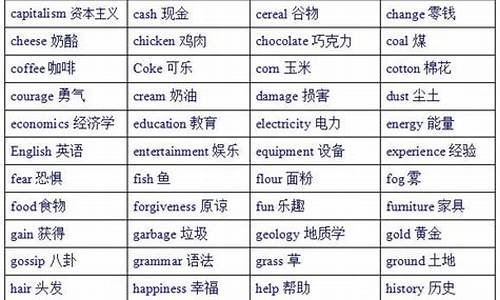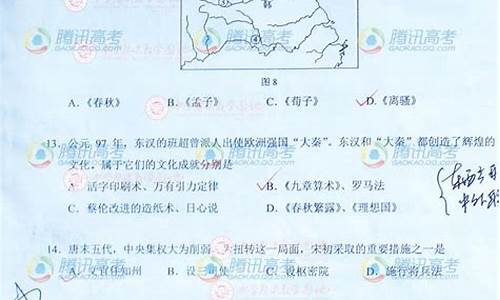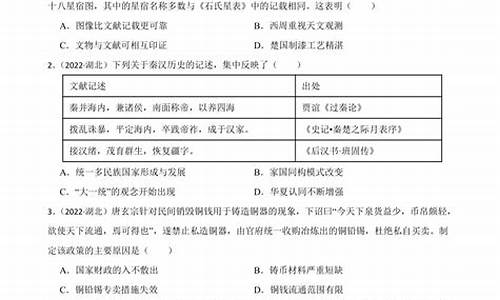您现在的位置是: 首页 > 热门专业 热门专业
高考不可数名词汇总_高考 不可数名词
tamoadmin 2024-05-28 人已围观
简介1.高考英语词汇详解:pain的用法整理2.可数名词和不可数名词是什么?3.news(新闻,信息)是不可数名词吗4.高考英语完形填空高频词汇大全值得收藏5.可数名词和不可数名词口诀6.高考英语完形填空常考单词高考英语语法:英语名词的可数性 名词根据其可数性,可分为可数名词与不可数名词。一般说来,个体名词和大部分集合名词是可数的;而专有名词、物质名词、抽象名词以及少部分集合名词则通常是不可数的。但
1.高考英语词汇详解:pain的用法整理
2.可数名词和不可数名词是什么?
3.news(新闻,信息)是不可数名词吗
4.高考英语完形填空高频词汇大全值得收藏
5.可数名词和不可数名词口诀
6.高考英语完形填空常考单词

高考英语语法:英语名词的可数性
名词根据其可数性,可分为可数名词与不可数名词。一般说来,个体名词和大部分集合名词是可数的;而专有名词、物质名词、抽象名词以及少部分集合名词则通常是不可数的。但是这种区分只是大致的,原则性的,并不是绝对的。英语有些名词往往既是可数也可以是不可数的:
A:Would you like a cake? 要吃块蛋糕吗?
B:No, I don’t like cake. 不吃,我不喜欢吃蛋糕。
以上第一句用 a cake,这是把 cake 视为一块一块的“蛋糕”,所以它是可数的;而第二句只用 cake,这是把它当作物质名词看待, 所以它成了不可数名词。
下面我们按照名词的不同类别,分别讨论名词的可数性问题。
1. 专有名词的可数性
在通常情况下,专有名词具有“独一无二”的含义,因此它通常没有复数形式,即不可数。但是,专有名词的独一无二性通常是相对的,随着范围的扩大,这种独一无二性便会受到破坏。如在一个星期(week)内,只有一个星期六(Saturday), 一个星期日(Sunday)等,但是在一个月中甚至一年中,便有多个星期六,多个星期日了。所以我们有时可以说:
We have spent many happy Sundays there. 我们在那儿度过了许多个愉快的星期日。
又如,在一个小范围内,可能只有一个 Henry,但在一个较大的范围内则可能有多个 Henry, 因此我们有时会见到这样的句子:
There are five Henrys in our school. 我们学校有五个亨利。
另外,若专有名词转化成了普通名词,也可以是可数的:
Thousands of Lei Fengs have emerged in China. 中国涌现出了千千万万个雷锋。
2. 个体名词的可数性
个体名词表示的是一个一个的人或物的个体,所以它通常是可数的:
All of the students are interested in it. 所有的学生对此都很感兴趣。
There are trees on any side of the square. 广场的每一边都种有树。
3. 物质名词的可数性
由于物质名词在通常情况下不能分为个体,所以它通常是不可数的。但是,在某些特殊情况下(如表示种类等),有些物质名词也可以连用不定冠词或用复数形式:
wine 酒(不可数), a wine 一种酒(可数)
beer 啤酒(不可数), two beers 两杯啤酒(可数)
glass玻璃(不可数), some glasses 一些玻璃杯(可数)
4. 抽象名词的可数性
抽象名词是表示事物性质、行为、状态、感情等抽象概念的,因此它通常是不可数的。但是,有时抽象名词也可转化为具体名词(可数),表示具有某种性质的人或事物:
success 成功(不可数),a success 成功的人或事(可数)
pleasure 愉快(不可数),a pleasure 令人愉快的人或事(可数)
5. 集合名词的可数性
集合名词表示若干个体组成的集合体,它本身通常是可数的,其复数形式表示多个集合体:
a family 一个家庭,three families 三个家庭
a team 一个队, two teams 两个队
a crowd 一群人, crowds 多群人
高考英语词汇详解:pain的用法整理
为了让大家熟悉高考英语名词考点,能在考试中取得高分。下面由我为你提供的,希望能帮到你。
一
1. I found her sitting in the corner, reading _____ newspaper, with _____ in her eyes.
A. a, tear B. a piece of, tears C. a, tears D. a piece of, tear
陷阱误选D,许多学生错误地认为,既然news***讯息***和 paper***纸***均为不可数名词,那么newspaper***报纸***也应是不可数的;同时认为“眼泪”即“泪水”,“水”不可数,“泪水”和“眼泪”也应该不可数。
分析最佳答案为C。newspaper和 tear均为可数名词,它们不仅可以连用不定冠词、可以用复数,而且还可以连用数词。
Her eyes filled with tears. 她热泪盈眶。
She dried her tears with a handkerchief. 她用手帕擦干了眼泪。
The newspapers were full of lies. 报纸上一片谎言。
A newspaper is a publication. 报纸是一种出版物。
若不是将 newspaper 当作是供阅读或传递资讯的一种东西,而只是把它当成一种“纸”来看待,也可用作不可数名词,如:
Wrap it in ***a sheet of*** newspaper. 把它用张报纸包起来。
2. Her father works as a ______ in a hotel and her mother a ______ in a private pany.
A. cooker, typewriter B. cook, typist C. cooker, typist D. cook, typewriter
陷阱误选A,许多同学想当然地认为:cook 用作动词,表示“煮饭”,所以 cooker 应是其相应的名词,表示“煮饭的人”,即“厨师”;type 用作动词,表示“打字”,所以 typewriter 应表示“打字员”。
分析而事实是:cook=厨师,cooker=炊具;typist=打字员,typewriter=打字机。即此题正确答案为B。
3. “Why couldn’t they meet us at five o’clock?” “Because they were delayed by ________.”
A. heavy traffic B. heavy traffics C. crowded traffic D. crowded traffics
陷阱B、C、D三项均容易误选。
分析对于此题,首先要明确traffic为不可数名词,没有复数形式,故排除B和D。另外,汉语习惯说“交通拥挤”,而英语习惯上却不能用crowded 来修饰 traffic,要表示汉语的“交通拥挤”,英语通常说heavy traffic,即选A。如下面一题也是选A:
She is not a petent driver and can’t cope with driving in _______.
A. heavy traffic B. heavy traffics
C. crowded traffic D. crowded traffics
4. In fact, _______ one cause that leads to the problem.
A. cattle is B. cattle are C. cattles are D. the cattles are
陷阱此题容易误选A,想当然地认为cattle是单数,并且空格有表单数的one,自然谓语动词用is。
陷阱其实,正确答案为B。cattle***牲畜,牛***为 *** 名词,尽管它不带复数词尾-s,却永远表示复数意义,若用作主语,谓语要用复数。又如:
For this many cattle were killed. 为此宰了不少牲畜。
The prisoners were herded like cattle. 囚犯像牲口一样被赶到一起。
类似地,police***警察***,people***人***,police***警察***,poultry***家禽***等也具有同样用法,即只有单数形式,但却表示复数意义;用作主语时谓语通常也用复数;不与 a***n*** 连用,但可与the连用***表示总括意义和特指***。如:
The poultry have been fed. 家禽已经喂过饲料了。
In Britain police do not usually carry guns. 在英国警察通常不带枪。
It annoys me when people forget to say “thank you”。 遇到有人忘记道谢的时候,我就不痛快。
5. By all _______, you must try every _______ to help him.
A. mean, mean B. means, means C. means, mean D. mean, means
陷阱误选C,认为第一空前有all修饰,故用means,而第二空前有every修饰,故用mean。
分析其实,means是一个单复数同形的名词,并且永远带有尾-s。换句话说,在表示“方式”、“方法”时,不存在mean这一形式***mean主要用作动词,表示“意思是”;也可用作名词,表示“中间”、“中庸”***。此题正确答案为C,by all means为习语,意为“一定”、“尽一切办法”。means用作主语时,其谓语的数需根据句意来确定。比较:
All possible means have been tried. 所有可能的办法都已经试过了。
Every possible means has been tried. 每种可能的办法都已经试过了。
若句意不能明确地表明主语的单复数,其谓语则用单数或复数均可。如:
Is [Are] there any other means of getting more money? 还有其他什么办法可弄到更多钱吗?
二
6. Jim is ______ person, and everyone is willing to be ______ with him.
A. so kind a, friends B. so a kind, friends C. so kind a, friend D. so a kind, friend
陷阱误选C或D。认为 friend要用单数。
分析其实此题最佳答案为A。so kind a person相当于such a kind person,注意两者中冠词的位置不同。be friends with是习语,意为“与……友好”、“跟……做朋友”,与之同义的类似地还有make friends with。值得说明的是,这类短语中的名词总是用复数,即使句子主语为单数也是如此。如:
He is friends with me. 他与我是朋友。
He has made friends with everyone here. 他与这儿的每个人交上了朋友。
7. We already have ______ pencils, but we need two ______ pens.
A. dozen of, dozen B. dozens of, dozens C. dozens of, dozen D. dozens of, dozen of
陷阱误选 B。
分析此题最佳答案为C。关于dozen的复数是否加词尾-s的问题比较复杂,大致原则是:
***1*** 当它与具体数字连用时,既不加复数词尾-s,也不后接介词of。尽管有的词书也有 two dozen of 这样的用例,但这已属过时用法,在考试中应避免,如1992年全国高考有一道单项选择题就认为two dozen of为错误选项:
Shortly after the accident, _____ police were sent to the spot to keep order.
A. dozens of B. dozens C. dozen of D. dozen [D]
***2*** 当它不与具体数字连用,而是表示不确定的泛指数时,则不仅要加复数词尾-s,而且要后接介词 of,此时可将dozens of***许多,几十***视为习语。如:
I’ve been there dozens of times. 我去过那儿几十次。
She’s got dozens of boy-friends. 她的男朋友很多。
下面一例中的dozens加了复数词尾-s也属为似情况:
Pack them in dozens. 按打装袋吧。
***3*** 当与 a few, several 等数目不很具体的词连用时,加不加复数词尾-s均可,但需注意:不加复数词尾-s时,其后的介词of可以省略;加词尾-s时,其后介词 of不能省略。如:
several dozen ***of*** pencils=several dozens of pencils几打铅笔
注:英语较少使用many dozen的说法,要表示类似意思可用dozens of。
***4*** 当它后面的名词受 the, these, those 等特指限定词修饰时,或其后的接的是us, them这样的人称代词时,则此时必须用介词 of。如:
two dozen of these eggs 两打这种鸡蛋
three dozen of them 它们中的3打
注:score, hundred, thousand, million等也具有以上类似用法。
8. She raised her finger to her lips as _____ for silence.
A. an idea B. a mark C. a sign D. a word
陷阱容易误选B。
分析应选C,sign与mark的区别是:sign 的意思是“迹象”、“征兆”gesture or movement made with the hand, head, etc, used to give information, a mand, etc***用手或头等做出示意动作以传递资讯或命令等***,mark 的意思是 written or printed symbol or figure, line etc made as signor an indication of sth***书写与印刷的符号或图、线等记号***。
根据此二词的语义区别以及常识可知答案为C。类似地,下面两题的答案也是C:
***1*** Those black clouds are a sure _____ that it’s going to rain.
A. thing B. mark C. sign D. one
***2*** Just as a famous Chinese saying goes, a timely heavy snow is a ______ of good harvest next year.
A. mark B. track C. sign D. appearance
但是,下面一题却不能选sign,也不能选mark,而选symbol***象征***:
The lion is considered the king of the forest as it is a***n*** _____ of courage and power.
A. example B. sign
C. mark D. symbol
在近几年的高考中像这类结合词义区别以及语境和生活常识进行考查的试题经常出现,同学们需引起注意。
9. “May I take your order now?” “We’d like three black _______ and two green _______.”
A. coffee, cups of teas B. coffees, teas C. cups of coffee, tea D. cup of coffees, teas
陷阱误选C,认为coffee和tea均为不可数名词,不能后加复数词尾-s,从而排除选项A、B、D。
分析选B。有的同学认为 coffee 和tea是物质名词,不可数,不能用 three coffees, two teas 这样的表达。其实,coffee既可用作不可数名词,表示“咖啡”这种物质,也可用作可数名词,表示“一杯咖啡”,即在口语中 three coffees 就等于 three cups of coffee。同样,“三杯茶”既可说成 three cups of tea,也可说成 three teas;“三杯啤酒”既可说成 three glasses of beer,也可说成 three beers。
10. _____ is a good form of exercise for both young and old.
A. Walk B. Walking
C. The walk D. To walk
陷阱容易误选A或D。
分析最佳答案为B。分析如下:
***1*** 首先,选项D不如选项B佳,因为,不定式通常表示特定的动作,而动名词才表示习惯性的动作。
***2*** 尽管walk用作名词时可以表示“散步”,但它是可数名词,指的是一次一次的具体的散步,而不表示抽象意义或泛指意义的“散步”,要表示此义,要用动名词 walking。比较:
How about going for a walk? 出去散散步如何?
Walking does good to your health. 散步对你的健康有益。
类似地,dance 和 dancing 以及 swim 和 swimming 的区别也是一样:
***1*** 名词的 dance表示“跳舞”,是可数名词,指的是一次一次的具体的跳舞,而不表示抽象意义或泛指意义的“跳舞”,要表示后者的意思,要用动名词转化来的名词 dancing。比较:
Let’s have a dance. 我们跳曲舞吧。
He is interested in dancing. 他对跳舞感兴趣。
***2*** 名词的 swim表示“游泳”,是可数名词,指的是一次一次的具体的游泳,而不表示抽象意义或泛指意义的“游泳”,要表示后者的意思,要用动名词转化来的名词 swimming。比较:
She had a swim every day. 她每天游一会儿泳。
She loves swimming. 她喜欢游泳。
可数名词和不可数名词是什么?
提要高考 : 2017高考英语词汇详解:pain的用法
高考英语词汇详解:pain的用法
一、表示肉体上的“痛”“疼痛”
1. 可数性问题:此时可用作可数或不可数名词。如:
This tooth is giving me pain. 这颗牙很疼。
Mary felt a sharp pain in her left arm. 玛丽左臂感到一阵剧烈的疼痛。
Chest pains may be symptomatic of heart disease. 胸痛可能是心脏病的症状。注:由于可用作可数或不可数名词,所以有时在同一语境中用pain, a pain, pains都是可能的。如:
I have pain [a pain, pains] in my back. 我背疼。
2. 修饰语问题:用作不可数名词,可用much, little等修饰;用作可数名词时,可用many, few等修饰。如:
Was it possible to have so much pain that it could no longer hurt? 痛得很厉害以至不再感到疼痛,这种情况可能吗?
After falling from a ladder, he had many physical aches and pains. 从梯子上摔下来以后他感到身上到处都痛。
3. 主谓一致问题:pain用作主语时,谓语肯定用单数,这不是问题;当pains用作主语时,谓语通常用复数。如:
If the pains return phone the doctor. 如果疼痛再发作,打电话给医生。
Her pains are mostly pure imagination. 他的疼痛多半纯粹是想象出来的东西。
但是,有时也可用单数。如:
Growing pains refers to pains in the joints and muscles of growing children. 发育性疼痛乃指正在发育成长的`儿童的关节和肌肉所感到的疼痛。
二、表示精神上的“痛苦”
1. 可数性问题:此时只用作不可数名词,不用复数形式,也不与不定冠词连用。如:
I could not stand the pain any longer. 我再也忍受不了这种痛苦了。
I hope you will forgive me if I have given you pain.如果我给了你痛苦,希望你原谅我。
2. 修饰语问题:通常可用great, some, no, a great deal, much等修饰。如:
The memory of her mother’s illness caused her great pain. 想起妈妈的疾病她就感到痛苦。
His harsh words caused her much pain. 他说话很刺耳,她听了很不舒服。
It gave us much pain to learn of the sad news. 听到这个不幸的消息我们十分痛苦。
3. 主谓一致问题:由于不可数,用作主语时,自然要用单数谓语。
news(新闻,信息)是不可数名词吗
意思见下面:
可数名词是指能以数目来计算,可以分成个体的人或东西;因此它有复数形式,当它的复数形式在句子中作主语时,句子的谓语也应用复数形式。
不可数名词是指不能以数目来计算,不可以分成个体的概念、状态、品质、感情或表示物质材料的东西;它一般没有复数形式,只有单数形式,它的前面不能用不定冠词a/an。
高考英语完形填空高频词汇大全值得收藏
是的。news(新闻),information(消息),furniture(家具),homework(家庭作业),housework(家务活),advice(建议)都是不可数名词,而且高考很常考这些哦
望采纳,O(∩_∩)O谢谢
可数名词和不可数名词口诀
动词类:
1. “看” :look; see; watch; observe; notice; catch sight of; stare; glare; glance; glimpse; see a film; watch TV;
2. “说” :telll sth to sb.=tell sb sth; talk with sb about sth; say
sth; speak in English; whisper sth to sb; inform sb of sth; reason
/talk/persuade sb into doing sth; bargain; cha; repea; explain; warn;
remind; discuss; debate; figure; declare; claim; mention; admit; deny;
describe; announce; introduce; complain
3. “叫” :cry; call; shout; scream; moan; sigh; quarrel
4. “问” :ask; interview; express; question
5. “答”:answer; respond; reply
6. “听”:listen to; hear; pick up; overhear
7. “笑”:smile; laugh; burst into laughter; burst out laughing
8. “哭”:cry; shed tears; weep; sob; burst into tears /burst out crying
9. “吃/喝” :eat/drink; sip; have a meal; have supper; toast; taste; treat sb to; help oneself to
10. “穿” :put on; wear; have on; be dressed in; make-up; get changed; be in red; take off ; remove
11. “行” :walk ; run ; climb; jump; skip; slip; come/go; enter; move; drive; ride; fly; crawl
12. “坐” :sit down; be seated; seat oneself; take a seat/ stand; lean
13. “睡/休息” :lie /on one’s back/on one side/ on one’s stomach; stay
in bed; have a rest; take a nap; be asleep; bend; turn over; rest
14. “写” :dictate; write sth; describe; drop a line; draw; take down/write down
15. “拿/放”: take; bring; hold; carry; fetch; lif; put; lay; pull; push
16. “抓” :take hold of; seize; grasp; scratch
17. “打” :hit; beat; strike; blow; attack
18. “扔” :throw; drop; fall; wave; shake
19. “送” :send; deliver; give; offer; see off
20. “摸/抱” :ouch; fold; embrace; hug; hold; in one’s arms
21. “踢/碰” :kick; knock; tip
22. “找/查” :find; look for; find out; discover/explore; hunt for;
search for seek / seek for in search of; search sb; search sp. for sth;
check; examine; test; inspect
23. “得” :get; obtain; acquire; gain; possess
24. “失” :lose; be lost /be missing; gone; great loss
25. “有” :have; own; conquer; occupy =possess
26. “无” :nothing left; the remaining thing; disappear; be missing /gone
27. “增/减” :rise / go up /drop; raise; bring down /reduce; increase/decrease
28. “买/卖” :buy; purchase; afford; pay; pay off ; pay for; sell; on
sale; bargain; bill / cheque / cash/credit card/notes/coins; discounts
29. “存在/消失” :come into being; exist; appear; survive ; live; show;
turn up; disappear; die; die out; pass away; be out of sight
30. “变化” :develop; improve ; become; grow; go+ bad /wrong/ sour
/without( negative adj.) turn + colour; change /change into; reform
31. “成功/失败” :make it; succeed; make progress; come true; realize
one’s dream; win; lose; fail to do; defeat; suffer loss; beat; turn sth.
into reality
32. “努力” :try /manage; make efforts; attempt ; do ones best; do as much as one can to do
33. 祝贺:congratulate sb. on sth.; celebrate; observe; get together
34. 敬佩:admire; respect; show respect for/to; adore; envy /be jealousy
35. 赞美/批评:praise; think highly of; blame sb for sth; sb is to
blame; criticize /scold sb. for sth.; have a low opinion of sb; speak
ill of
36. 喜/恶:like; love; be fond of ; be keen on; be crazy about; adore; be into; prefer; enjoy; dislike hate; ignore
37. 到达:arrive at; reach; return to; get to; stay in sp.; visit; leave; leave for
38. 受伤:hurt ; injure; wound; cut; kill; drown; bleed; get burnt; suffer from; suffer a loss
39. 损坏:damage; destroy; ruin; break down; crash; be broken
40. 修复: repair; rebuild; restore; fix; recover oneself
41. “认识的过程” :feel; sense; guess; suppose; wonder; doubt; know
/learn realize understand remember; be familiar with; recall; recite;
apply to
42. 认为;判断:think; believe; consider; find; feel; conclude; infer; doubt
43. 想/考虑:think of…as; think about; consider; think over
44. 支持/反对:agree; disagree; accept; receive; refuse; turn down; be against; elect; vote for/ against
45. 花费:sth/doing sth+cost; sb+spend+ in doing sth; sb+afford +n/to
do sth ; It +takes/took some time/ money/energy to do sth; sb pay some
money for sth.
46. 省/存钱:save /save up; set aside; put away; spare no effort/ time
47. 参加:take part in; join /join in; attend; compete in/ for/against
48. 控告:accuse sb. of; charge sb. with
49. 救治/帮助: help /help out; save /rescue sb from sth.; treat; cure
sb. of sth; aid sb in doing sth / to do sth; help sb with sth assist sb
in doing sth
50. 逃避:run away; escape from; flee; hide
51. 阻止/禁止:prevent / keep/ stop sb. from doing sth; forbid doing sth.; ban; prohibit
52. 对付/处理:handle / do with / deal with /tackle /overcome sth ; solve; settle
53. 效仿:copy; imitate; learn from; learn
54. 爆发/发生:come about; happen to; take place; break out; burst out; go off; explode
55. 安装/装备:fasten; fix; set; equip; be armed with; be equipped with
56. 追求:pursuit; ran after; seek after; chase; catch up with; keep up with
57. 建议:advise; suggest; recommend; propose; urge; demand; persuade
58. 打算:plan / intend / design to do; be going to do /be about to do /will do
59. 似乎/好象:seem; appear; look like/ as if /as though
60. 开办/关闭:open; start; set up; close/close up; end; close down
名词类:
?
1假期 vacation holiday spring break ask for leave be on holiday have two days off
2旅游 trip journey tour voyage travel tourist passenger go camping/picnicking/hiking
3职务人员 clerk secretary passer-by friend minister manager waitress guest host hostess
Assistant customer adult neighbor relative patient /vet staff crew nurse teacher
Conductor tailor sailor inventor gardener guard
4餐馆/定餐/就餐 inn restaurant kitchen menu bill order tip fork and knife
reserve /book table Taste delicious salad dash vegetables fruit tray
napkin
5诊所/看病/服药 clinic hospital take one’s temperature take
medicine/pills have a fever/flu/headache doctor physician surgeon
specialist patient
6车站/机场 airport on board miss the train/bus catch a train meet sb.
7身体部位 arm head hair brain waist back shoulder pulse wrist
8意志 will courage patience determination faith effort confidence ambition energy
9才能/品质 talent gift ability potential intelligent promising smart stupid careful proud
Strict honest cold serious easy-going learned knowledgeable
10优缺点 advantage disadvantage strength weakness
11目标 aim goal intention purpose belief faith
12方式 means method way manner approach
13身体素质 strong weak pale sick ill be well keep slim/ fit cut weight/put on weight
14图表 photo picture graph drawing table line/bar graph pie chart draw a sketch 划草图
15文章 reading translation essay poem paper novel/fiction article
magazine newspaper journal 日志 diary日记 Files form make a list of
16课堂class course lecture example reason message notes words phrase scholarship degree
Subject question trouble difficulty grades read comment marks
17 学校活动 match game activity hold a meeting /debate /speech/ ceremony
18建议/观点 advice suggestion idea proposal view recommandation
19气候/天气 climate weather storm windy cloudy rainy snow hot/cold/freezing/heat/warmth
20交通 by train/bus /boat bike on the train/bus /a bike drive a car ride a bike
give sb. a lift/ride
21习惯 habit custom get used to regular有规律的(形容词) practice惯例(名词)
22感觉 sight hearing touch smell sense
23情感 feeling emotion anger delight sadness sorrow
24 财富 money possessions wealth belongings fortunes treasure diamond be rich/well-off
25 运动比赛 on the playground on the track and filed pitch event game
match sports player Coach judge jogging weightlifting play
volleyball/soccer/
26衣服 clothes, cloth, clothing clothes统指各种衣服,谓语动词永远是复数, cloth指布,为不可数名词 clothing 服装的总称,指一件衣服用a piece of, an article of
27事件 incident, accident incident指小事件, accident指不幸的事故
形容词类
1人的各种感受
乐happy delighted to one’s joy pleased amused
悲 sad unhappy painful bitter
平静 calm quiet silent/still peaceful
烦bother bored be fed up with
震惊 surprised astonished shocked /amazed
怕 in fear be frightened /scared /afraid
失望desperate disappointed hopeless be depressed
满意be satisfied with /be content to do
生气 Annoyed angry disgusting burst into rage
2 表程度的副词类
narrowly/ Nearly/ almost hardly/ hard extremely/ very very/ quite
Accidently/ once in a while occasionaly/ once far / by far
Farther/ further better/ worse be well/ good however/ therefore/so/thus
高频词组大全
With the help of 在~~帮助下
under the leadership / care of 在~~领导/关心下
be strict with sb. 对~人要求严格
be strict in sth. 对~事要求严格
at present=at the present time 目前
for the present 暂时
in the sun/sunshine 在阳光下
under the sun 在世界上
lie in 位于~~之内
lie on 同~~接壤
lie to 位于~~之外
at least 至少
in the least 丝毫,一点
by name 名叫
in the name of 以~~名义
in the air 空中,在流传
on the air 播出
in the way 挡路,障碍,用~~方法
In a way 在某点上,在某种程度上
get one’s own way to do 随心所欲
give way 让步,屈服
ose one’s way 迷路
by the way 顺便说一下
on one’s way to 在去~~的路上
Come this way 这边走
at the corner 在拐角处(外角)
in the corner 在角落里(内角)
on the corner 在角落上(外角上)
judge by / from 根据~~来判断
judge for oneself 由某人自己来判断
at the end (of) 在~~结束时
at the beginning of 在~~开始时
at the back of 在~~背后,支持
at the age of ~~岁时
at the foot of 在~~脚下
at the bottom of 在~~底部
at the top of 在~~顶上
at/on the edge of 在~~边上
in the course of 在~~过程中
in the eyes of 从~~观点看来,在~~眼里
in the face of 面对~,尽管,纵使
in the middle of 在~中间
in the end =at last=finally 最后
on the eve of 在~~前夕
on the side of 在~~一边
after a time = after some time 过一段时间后
for a time = for some time 一时,有一段时间
behind time 迟到,过期
behind the times 落在时代后面
at no time 决不
in no time 立即,马上
at one time = once time 曾经
at a time = each time 每次
at times = sometimes 有时
at all times 经常,一直,始终
at the same time 同时
at the time 在~~的时候
by the time 到~~的时候
for a moment 一会儿
for the moment 暂时
at the moment 当时
the moment /minute /instance 正当~~一刹那
once or twice 一两次
more than once 不止一次
once more 重新,又
once upon a time 从前
once in a while 偶尔
1. 以break为中心的词组
break away from 脱离,逃离
break down 破坏,粉碎;瓦解;出故障,抛锚
break in 闯进,打断;使顺服
break into 闯入;强行进入;突然开始
break out 爆发,发生;准备使用;起锚
break the law 违反法律
break the record 破记录
break one’s promise 失言
break up 开垦,破碎;解散,分开,分解
2. 以catch为中心的词组
be caught doing 被发现做某事 be caught in the rain 淋雨
catch a bus/train 赶汽车/火车 catch a cold 伤风,感冒
catch one’s word 听懂某人的话 catch sight of 发现,瞥见
catch up with 赶上,追及,追上
3. 以come为中心的词组
come across 偶尔发现,想起;越过;偿付
come along 一道来,陪伴;进步,进展;出现
come at 达到,求得,得到;扑向,袭击
come back 回来;恢复,复原
come down 倒下;降落;跌落;病倒
come from 来自,起源于,从~~产生,生于
come in 进来,进入;流行起来;获名次
come into being 发生,产生,出现,形成
come into power 开始执政,当权,当选
come into use 开始使用,获得应用
come on 上演;开始;赶快;发展;登台;(问题)被提出
come to know 开始了解到
come out 出来,传出;出版;结果是;褪色;(秘密)泄露
come to 苏醒,复原;共计;达到;归结于
come to an end 终止,结束
come true 实现,成为现实;证实
come up 走近;上楼;长出,发芽
4. 以do为中心的词组
be done in 精疲力竭 be done with 完全结束
do a good deed 做一件好事 do away with 去掉,废除;弄死;浪费
do good to (=do sb. good) 有益于 do harm to (=do sb. good) 有害于
do its work 有效,有作用 do much 极有用
do wrong to 做错 do one’s best 尽某人最大努力
do one’s homework 做作业 do one’s utmost 尽力而为
do proud 足以使~~骄傲 do sb. justice 公平对待某人
do some cleaning (V+ing,etc.) 搞卫生 do sb. a favor 帮助某人
do well in 学得不错,干得漂亮 do with 和~~相处,忍受,处理
do without 不需要,不用 do wonders 创造奇迹
have much to do with 和~~很有关系 have nothing to do with 与~~无关
have something to do with 和~~有关 in doing so=in so doing 这时,在这种情况下
That will do. 行了;够了
5. 以get为中心的词组
get about 徘徊,走动,旅行;流传 get above oneself 自视高傲
get accustomed to 习惯于,对~~习以为常 get across 度过,通过,横过;说服,使理解
get ahead of 胜过,超过 get along 前进,进步;同意;离去
get along with 与~~相处 get at 发现,了解;掌握;攻击
have got to do 不得不,必须 get away 离开,逃脱
get back 取回,回来;报复 get behind 落后;识破
get down 咽下;写下;使沮丧,使抑郁 get down to 认真对待,静下心来
get familiar with 熟悉 get hold of 获得,取得
get home 到家
get in 进入,陷入;牵涉
get off 送走;脱下(衣服);下车;
动身 get on 上车;穿上;进步,使前进;成功;相处
get upon with 进步;在~~方面获得成功
get one’s hand in 熟悉;习惯
get out of 由~~出来,从~~得出;避免;退休
get over 越过;恢复,痊愈;克服;完成
get ready for 为~~作准备
get rid of 除去,去掉;免除,摆脱
get through 到达,完成,通过;及格
get together 积聚,积累;商谈,取得一致意见
get up 起床,起立;研究,钻研;致力于;安排,组织
get used to 习惯于
6. 以give为中心的词组
be given to 沉溺于,癖好 give about 分配;传播
give and take 相互迁就 give away 赠送;牺牲;泄露;颁发
give back 归还 give cause 给予~~的理由
give ear to 侧耳倾听 give forth 发出,放出;发表
give in 屈服,让步,投降 give in to 同意,接受;向~~让步
give off 发出(烟,气味) give oneself out to be/as 自称为
give oneself up to 专心于;向~~自首 give out 分发,公布
give place to 让位于,被~~所替代 give rise to 引起,导致;使~~发生
give sb. to understand 通知某人 give up 放弃;停止
give way to 让步,退却;屈服于
7. 以look为中心的词组
look about 四下环顾;查看 look after 照顾,看管
look around 东张西望 look at 注视,着眼于
look back 回顾 look for 寻找;期待,期望
look down on 俯视;轻视 look forward to 盼望,期待
look into 窥视;调查;浏览 look like 看起来象
look on 旁观;面向 look out 向外看;注意;当心,堤防
look over 从上面看过去;检查 look through 透过~~看去;看穿;浏览
look up to 仰望,尊敬
8. 以make为中心的词组
be made from 由~~原料制成
be made of 由~~材料制成
be made up of 由~~组成
make a fool of 愚弄,欺骗
make a mistake 弄错
make a point of doing 强调;认为~~重要;决心,坚持
make advantages/use of 使用,利用
make after 追求,追赶
make believe 假装
make certain 确信,把~~弄清楚
make contact with 接通,与~~接触,与~~联系
make for 去向,向~~前进;有利于
make friends with 和~~交友
make into 把~~制成,使~~转变为
make much of 重视;理解;赏识
make one’s mind on sth. 决定某事
make one’s own 当作自己的看待
make oneself at home 随便,别拘束
make out 填写;开支票;理解;辨认
make the best of 尽量利用;极为重视
make up 弥补,修理;赔偿,补偿;起草;编造;化装
make up to 接近,巴结;向~~求爱
make way for 为~~让路,让路于
on the make 急求成功;增加
9. 以put为中心的词组
put aside 把~~放在一边;搁置;排除
put away 把~~放好,把~~收拾;储藏;吃喝,吃掉
put back 把~~放回原处;驳回
put down 放下;镇压;制止;记下;削减;降落
put forward 提出;拨快;建议,推荐;提倡,倡议
put ~~ into 把~~放入;插入;翻译成
put off 推迟,延期;消除;推脱,推辞
put on 上演;穿上,带上
put up with 忍受,容忍
put one’s heart into 全神贯注,专心致志
put up 举起,挂起;提名,推荐;陈列
10. 以take为中心的词组
be taken aback 吃惊 take a seat 就坐
take a shower 淋浴,洗澡 take aim 瞄准,设立目标
take away 拿走,减去;夺去 take ~~ by surprise 出奇制胜
take one’s place 就坐,入坐
take care of 当心,注意;照顾;提防;谨慎;处理,对付;负责
take office 就职,上任
take ~~ for 把~当作
take off 脱去,除去;离开;起飞;模仿;起程;致死;复制,作副本;减弱
take one’s temperature 量体温
take part in 参与,参加
take it easy 别着急,慢慢来
take place = happen 发生,举行
take the place of 代替 take pride in 以~~为荣,对~~骄傲
take sb. by the arm 拉某人的胳膊
11. 以turn为中心的词组
give a new turn to 对~~予以新的看法
in one’s turn 轮到某人做某事
out of turn 不按次序的,不合适宜的
take one’s turn to do 轮到做
turn a blind eye to 对~~视而不见
turn against 背叛,采取敌对态度
turn back 折回,往回走
turn down 折叠,翻下,驳回,拒绝考虑
turn into 走进;变成,变为
turn to ~~for help 求助于
turn off 关上(自来水,电器开关);解雇,辞退;避开(问题);制造;生产
turn on 打开(自来水,电器开关);反对;依靠,依赖,取决于
turn one’s attention to 把注意力转向
turn out 培养;证明是;制成;实际情况是
turn out to be 原来是,证明是,结果是
turn over a new leaf 翻开新的一页,重新开始,改过自新
turn (a)round 旋转,转过身来;改变意见;采取新政策
turn to 变成;着手于
turn upside down 颠倒过来,翻过来;使陷入混乱
学习资料站《 中学新概念英语 》
高考英语完形填空常考单词
最简单的就是 你看能不能数数 比如我英语老师十几年前说的一句话我记忆犹新 Cloud这个词一般不可数,因为乌云满天你没办法数出一二三 但是蓝蓝的天上白云飘的时候也可以说是 few clouds 因为这时候他们是一朵一朵的
下面是其他老师的汇总 可以参考
名词可以分为专有名词(Proper Nouns)和普通名词 (Common Nouns),专有名词是某个(些)人,地方,机构等专有的名称,如Beijing,China等。普通名词是一类人或东西或是一个抽象概念的名词,如:book,sadness等。普通名词又可分为下面四类:
1)个体名词(Individual Nouns):表示某类人或东西中的个体,如:gun。
2)集体名词(Collective Nouns):表示若干个个体组成的集合体,如:family。
3)物质名词(Material Nouns):表示无法分为个体的实物,如:air。
4)抽象名词(Abstract Nouns):表示动作、状态、品质、感情等抽象概念,如:work。
个体名词和集体名词可以用数目来计算,称为可数名词(Countable Nouns),物质名词和抽象名词一般无法用数目计算,称为不可数名词(Uncountable Nouns)。
高考英语完形填空常考单词
完形填空是高考英语中的一种题型,可以说是中学生最为棘手的题型之一。下面是我整理的高中英语完形填空常考单词,希望能帮到大家!
1、衣服
clothes统指各种衣服,谓语动词永远是复数
cloth指布,为不可数名词
clothing 服装的总称,指一件衣服,搭配a piece of, an article of
2、quiet, silent, still
quiet 安静的,可以发出小的声音;
silent 不发出声音,但可以动;
still 完全不动的,静止的,不动的`(He stand there still. )
3、before long, long before
before long 不久以后;
long before 很久以前;
例:not long before = before long
4、be about to, be going to, be to do+ when
be about to 表最近的将来,后面不接时间状语;
be going to 侧重打算,想法;
be to do 侧重意志,计划,安排 例:I?m to meet him.(含双方事先约好的意思)
5、bring, take, carry, fetch
bring 拿来;
take 带走;
carry 随身携带;
fetch 取,去回这一往返动作,例:fetch a box of chalk
6、参加
take part in参加(活动)
=join in=participate in参加
join 参加(组织,团体)
attend出席
attend to照顾
compete竞争
compete in 在?方面竞争
compete for为了?竞争
compete against 和?竞赛
7、控告
accuse sb. of sth指控某人
=charge sb. with sth控告某人做某事
8、敬佩/嫉妒
admire钦佩,羡慕,欣赏,赞美
respect尊重
show respect for对?表示尊重
respect sb for sth
adore 爱慕
envy v. 嫉妒
jealous adj. 嫉妒的
in honor of为了纪念,为了向?表示敬意
9、想/考虑
think of 考虑=think about
think of/consider+as +adj/n 把?看做
consider考虑
think over仔细考虑,慎重考虑
be concerned about担心,关心
10、in charge of, in the charge of
in charge of 管理,负责照料,例:He is in charge of the matter.
in the charge of 由?照料,例:The matter is in the charge of her.
15、in secret, in the secret
in secret 秘密地,暗自地,偷偷地,一般用作状语;
in the secret 知道内情,知道秘密,一般用作表语,My mother was in the secret from the beginning.
11、next year, the next year
next year 将来时间状语;
the next year 过去将来时间状语,例:He said he would go abroad the next year.
12、spend, take, pay, cost
spend 人做主语,花钱,花时间,sb spend 钱/时间on sth./(in) doing sth;
take 物做主语,花时间;it takes sb some time to do
pay 人做主语,花钱,sb pay (money) for sth;
cost 物做主语,花钱。sth cost sb 钱
13、join, join in, take part in
join 加入某个组织,并成为其中的一员,例:He joined the army five years ago.
join in 参加小型的活动,join sb. in
take part in 参加大型的活动。
14、the doctor and teacher, the doctor and the teacher
the doctor and teacher 指一个人,既是医生又是老师;
the doctor and the teacher 两个人,一个医生和一个老师。
;








